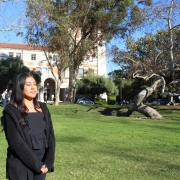Professor Vinay Lal, UCLA Professor of History and Asian American Studies, has an informative blog titled, “Lal Salaam: A Blog by Vinay Lal.” Recently, he has written “a series of articles on the implications of the coronavirus for our times, for human history, and for the fate of the earth.”
You may read his earlier essays on LA Social Science. The following is an excerpt of Part 1 of his sixth essay, “A Global Plague, Political Epidemiology, and National Histories,” (April 27, 2020), in the series:
COVID-19 has made diarists of many of us, but the Englishman Samuel Pepys (1633-1703) was, to use a contemporary expression, far ahead of the curve. Pepys, who lived through the Great Plague that struck London in 1665-66, as well as the Great Fire of London that over the course of five days in September 1666 gutted the old City of London, was a prodigious keeper of a diary that remains unrivalled in its depiction of the daily life of a well-heeled and influential man living in times of turmoil and pestilence. Pepys might well have been writing about the pandemic that has crept upon us: there is an uncanny resemblance to our times in his observations of how an epidemic insinuates itself among a people, the measures that were undertaken to effect its containment and mitigation, the pallor of death that hangs over an entire society when plague strikes, and what a plague brings out in a people and a nation.

Portrait of Samuel Pepys in 1666 by John Hayls
Pepys commenced his diary on January 1, 1660, and on 19 October 1663 first mentions the plague as having reached Amsterdam. The following year, on June 22, Pepys recorded that there was “great talk” at the coffee-house which he was fond of frequenting of “the plague [which] grows mightily among them [the Dutch], both at sea and land.” On July 25th, his visit to the coffee-house yielded “no news, only the plague is very hot still, and increases among the Dutch.” What impresses most thus far is that there is no intimation of the plague coming to the shores of England: perhaps the island was shielded, after all, from every pestilence coming from the continent. The Dutch and the English had been at war in 1652-54, and another conflict was looming on the horizon between the two naval powers competing for trade, overseas colonies, and supremacy on the seas. There is thus something of a suggestion of the Dutch being the source of many of England’s troubles: if they had already brought the plague of war, another form of pestilence seemed to be at hand. Pepys, a Member of Parliament and Chief Secretary to the Admiralty whose reforms would play a significant role in transforming the English navy, to the extent that the Royal Museums Greenwich website states that he is “often described as ‘the father of the modern Royal Navy’”, would also have known that the plague sails with ships—and that England was not likely to be spared.
To read the rest of the essay, click HERE.
To read, Part II “The Pub Crawl and the Sprint of the Virus: Britain, COVID-19, and Englishness” (April 28, 2020), click HERE.
Subscribe to LA Social Science and be the first to learn more insight and knowledge from UCLA social science experts in upcoming video/audio sessions and posts about current issues.









